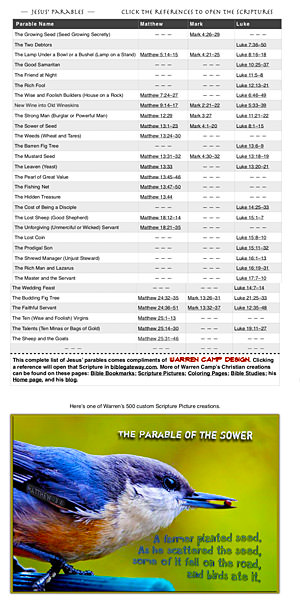
What’s its meaning? This timely parable is a “preparation” parable in which Jesus teaches us: “You must be ready!”
Warning: Don’t be caught unprepared for the Master’s return — Jesus’ second coming!

† Find Warren’s short summary at the bottom of page.


Click the list or the “bird” to enlarge and use Warren’s list of forty-four of Jesus’ parables (a PDF file with links to Scriptures).
Start Reading Warren’s Commentary . . .
Find his summary at the bottom.
par•a•ble [noun] a simple story used to illustrate the meaning of or a moral or spiritual lesson, as told by Jesus in the gospels
synonyms: allegory, moral story/tale, fable
Jesus’ Parable of the Watchful Servants
Luke 12:35–48
(Note: This parable, also known as the Parable of The Faithful Servant, The Returning Master and Watchful Servants, The Wise Manager, and The Doorkeepers, also appears in Matthew 24:36–51 and Mark 13:32–37.)
In Matthew’s gospel, it immediately precedes the Parable of the Ten Virgins, which has a similar eschatological theme of being prepared for the day of reckoning. In Mark’s, it follows the Parable of the Budding Fig Tree. In Luke’s, it follows the Parable of the Rich Fool. Warren has intentionally included this parable with these three and four others in his “Wisdom and Folly collection” of Jesus’ parables.)
Jesus says in his Watchful Servants Parable that we’re to be “Watchful and ready.” When he taught this parable, he wanted his listeners (including us today) to be watchful and ready for his return. He promised his followers that he’d come again to gather and live with Father God’s children. This “Be watchful!” directive isn’t a passing thought mentioned once or twice by Jesus; it’s a theme that he and New Testament authors bring forth continually.
We must put this parable into context to appreciate its purpose and meaning. Throughout history, many who’ve predicted the day Jesus would return have all been wrong. Because we hardly ever think about Jesus’ second coming, we’ve lost our understanding of “being watchful and ready.” That said, it’s likely that we haven’t made a strong, urgent, and dedicated commitment to live holy and godly lives.
Since no one can know the day or hour that the Lord will come, we must be constantly in a state of alertness, ready at any moment.
This short video from Discover Jesus reminds you to be prepared at all times for Jesus’ return. (3 minutes)
The Parable of the Watchful Servants
Jesus is definitely coming again. We had better be watchful and ready! We’re told in Acts of the Apostles that angels alerted the apostles, “Men of Galilee, why do you stand looking into heaven? This Jesus, who was taken up from you into heaven, will come in the same way as you saw him go into heaven” (Acts 1:10–11 ESV). Today, as dedicated disciples of Jesus, we must be ready and waiting for his return. So, let’s dig deeply into Jesus’ teaching on readiness.
In this Parable of the Watchful Servants, Jesus sets the scene: A master has gone to a wedding banquet; his servants are waiting up for him, though he’s delayed. The image seems to come from a rich household, perhaps Roman, where slaves are expected to anticipate their master’s wishes. The banquet in our passage is simply an element of the parable reflecting uncertain length; it indicates that the master is relatively close by and can return at any time. Similar to the waiting servants, the disciples are expected to be dressed and ready for the master’s momentarily expected return.
Note: The Lord’s words in this parable are closely linked to the previous warnings expressed in his previous parable: the Rich Fool Parable (vv. 13–21). In it, Jesus warns his listeners to not be worldly minded but instead be heavenly minded.
Regarding our need to remain awake and watchful for Jesus’ second coming, Pastor Bob Deffinbaugh says this: “Our culture is not inclined to wait. When you think of the Bible, waiting is one of the things men and women of faith are called to do. All of those named in the “hall of faith” (Hebrews 11) had to wait for God’s promised blessings; and they’re still waiting. Jesus calls upon His disciples to wait, for although He will return to the earth, to rule over it as Messiah, it may be a considerable period of time before this happens. Our text implies that there will be a wait. History confirms this, for the church has been waiting nearly 2,000 years for His return.”
The common thread through this and the other “Wisdom and Folly” parables (referenced above) is the suddenness of Christ’s next coming: He’ll definitely catch us off guard!
Waiting for the Master to Return (12:35–36)
There are at least three characteristics of a “good waiter.”
1. Preparation — (v. 35a)
35“Be dressed ready for service . . .”
The element of being “dressed” When preparing to serve a meal, a “good waiter” must be ready for action. Herein, the imagery that Jesus’ parable presents deals with clothing. Literally, waiters who are about to serve a meal to people must “gird up their loins” (1 Peter 1:13). No waiter could effectively serve a meal if a flowing robe got in the way; with the robe tucked in, the waiter would be “dressed ready for service.”
The point of this parable is that Christ will return at an unknown hour and his people must be ready. Being ready means being awake, watchful, and ready, preparing for Jesus’ second coming.
2. Maintenance — (v. 35b)
35“. . . and keep your lamps burning, . . .”
The burning lamps referred to in v. 35b are small clay lamps. To keep them burning required an expenditure of effort and resources, refilling them periodically with olive oil, trimming the wicks occasionally, and protecting the flame from the wind. Until the master comes, the lamps are to remain lit so that when he arrives, the house will be ready for his entrance. The master shouldn’t have to bang on the door and wait while his servants get up and come sleepily to the door, stumbling over things in the dark. When the master arrives, the servants must be dressed and ready (v. 35a). His coming should be their most important priority.
It’s important to realize and remember that every “good waiter” must work in a well-lit space, keeping his or her lamps burning to provide needed light. In the imagery of a returning master, the “Light” is required to illuminate the Lord’s way. While we strive to responsibly serve God, to do it effectively we must have the necessary illumination that only he provides: the light of Father God’s word that burns ever brightly (Psalm 119:105).
3. Expectation — (v. 36)
36“. . . like servants waiting for their master to return from a wedding banquet, so that when he comes and knocks they can immediately open the door for him.”
The third element of being the “good waiter” is to resemble a devoted servant who eagerly and attentively awaits his master’s expected return, likely coming from a wedding banquet. In this parable, Jesus suggests that the master had attended a delightful activity or event. The emotional state, therefore, of his arrival would definitely have been joyful and festive. The eager servant — albeit the “good waiter” — would be ready and eagerly able to open the master’s door immediately.
The Blessings of Waiting (vv. 37–38)
In vv. 37 and 38, Jesus promises blessedness, for “it will be good” for those who wait for his return. The word rendered “watching” in v. 37a is Greek gregoreo, “to stay awake, be watchful, be in constant readiness, be on the alert.” It comes from a word meaning “to wake or rouse up someone.”
37“It will be good for those servants whose master finds them watching when he comes. Truly I tell you, he will dress himself to serve, will have them recline at the table and will come and wait on them. 38It will be good for those servants whose master finds them ready, even if he comes in the middle of the night or toward daybreak.”
Jesus tells us in v. 36 that a master had gone away to attend a wedding that probably lasted several days. Because he’d return home at a time that hadn’t been predetermined, his servants needed to be ready for his arrival. When he finally came back, he gave an account for how they’d managed his affairs while he was away.
But the parable takes a strange twist in v. 37b — the roles are reversed: The master serves the servants! Apparently, the master, for whom they've so eagerly prepared, tells the servants to sit at the table. He prepares to serve them. He upends the world system by making the poor rich, the rich poor, the meek inherit, and the mournful leap for joy. And, in Jesus’ remarkable parable, the servants who wait up, dressed and alert to welcome their master with style, are rewarded a meal the master himself serves to them. What a wonderful and unexpected blessing! It brings to mind the breakfast that resurrected Jesus enjoyed with his apostles (John 21:1–14).
In v. 38, Jesus repeated his blessings promise to those who wait for his return, even if it’s delayed to “the middle of the night or toward daybreak.” Jesus thus implies that his return may well be later than we’d wish or suppose. Regardless, the blessings that accompany this return are in no way diminished; they’re as certain as his word. Thus, a waiting saint enhances his expectation.
Words of Warning (vv. 39–40)
Jesus now moves to a very different image: from master/servant to owner/thief. Let’s carefully compare both images that begin with a “But.” The master/servant image was intended to encourage those who’d wait as Jesus described; the owner/thief image is a warning to those who don’t expectantly await the Lord’s return. In the first image, Jesus is portrayed as the welcomed Master who comes with a reward; in the second, Jesus comes as an unwelcome thief whose arrival spells disaster. In the first story the master owns the house, but in the second, the man owns the house (with Jesus — the Son of Man — being viewed as the unwanted, unauthorized taker), losing his possessions. In the first image, the master is welcomed and let inside; in the second, the thief isn’t welcome.
39But understand this: If the owner of the house had known at what hour the thief was coming, he would not have let his house be broken into. 40You also must be ready, because the Son of Man will come at an hour when you do not expect him.”
What makes both accounts so different? What determines whether Jesus is a “welcome Master” or a “dreaded thief”? Quite possibly, the difference deals with “relationship.” There’s a loving bond between a Master and his servants; they know and love each other; they await his return because of who he is. But the homeowner doesn’t know the thief or doesn’t wish to; he hopes the Lord never comes, for his arrival is viewed as bringing a loss.
Peter Probes, Jesus Promises Blessings (vv. 41–44)
Read the next four verses to better appreciate Apostle Peter’s concern and the Lord’s response…
41Peter asked, "Lord, are you telling this parable to us, or to everyone?"
42The Lord answered, "Who then is the faithful and wise manager, whom the master puts in charge of his servants to give them their food allowance at the proper time? 43It will be good for that servant whom the master finds doing so when he returns. 44Truly I tell you, he will put him in charge of all his possessions.”
Peter must have been getting a little uncomfortable (v. 41). Jesus’ words contained both an encouraging promise of blessing, as well as a warning. Peter didn’t know to whom Jesus was referring, so he asked. Jesus purposely avoided giving Peter a direct answer. Why? Perhaps Jesus didn’t want to let Peter or the other disciples off too easily since he was dealing with principles that applied to all. Both the warning and the encouragement needed to be heard and heeded. The Lord’s question implied that Peter needed to think further, based upon what Jesus said.
Next, Jesus gets more specific as to the blessings that will accrue to those who eagerly await his return. He speaks of the blessing of the “faithful and wise manager,” presumably a disciple then (and today) who is faithful and wise in his service, and who’ll be rewarded with greater responsibility in God’s coming kingdom. The key to understanding our Lord’s words is to acknowledge who he sees as being the “steward” (NKJV, NASB, RSV) or “manager” (NIV, ESV) and the “servants” for whom the steward provides food at the proper time. Likely, the promoted steward/manager in heaven would be in charge of the same type of ministry he’d have handled while on earth.
This was a familiar story to people in Jesus’ day, living in a world of masters and slaves. Masters departed occasionally to conduct business. While away, they’d leave their affairs in the hands of servants who were to faithfully assume household responsibilities in the master’s absence. They were to oversee the distribution of household commodities to people needing to be cared for and fed. Upon that master’s return, when he finds that a servant has performed exactly as he was told to do, the master would bless him and also assign more responsibility to him because he’d proven himself (v. 44).
However, as we’ll next see, if upon the master’s return, he finds that a servant failed in his care-giving responsibilities to appropriately dispense food and resources to those in need, that servant would suffer considerably. Perhaps that servant actually abused the people in his care, possibly even harming and/or beating the men and women, maybe indulging himself so that he’d become gluttonous and drunk. In response, the parable says that when the master returns, there will be dire consequences for that servant: “The master will cut him in pieces and assign him a place with the unbelievers” (v. 46).
To better understand Jesus’ words, we should see the contrast in the next four verses — words of warning that Jesus speaks in vv. 45–48. Let’s examine that specific message, seeing what our Lord seeks to convey to his faithful followers.
Judgment and Punishment Are Based on How One Waits for Jesus (vv. 45–48)
In the parable’s closing verses, we return to the imagery of servant and master; but this time the servant is wicked. He doesn’t eagerly await his master’s return, his lamp isn’t lit, and he’s not dressed ready for service. The Lord gives a clear warning here, so let’s listen well to it.
45“But suppose the servant says to himself, ‘My master is taking a long time in coming,’ and he then begins to beat the other servants, both men and women, and to eat and drink and get drunk. 46The master of that servant will come on a day when he does not expect him and at an hour he is not aware of. He will cut him to pieces and assign him a place with the unbelievers.
47“The servant who knows the master’s will and does not get ready or does not do what the master wants will be beaten with many blows. 48But the one who does not know and does things deserving punishment will be beaten with few blows. From everyone who has been given much, much will be demanded; and from the one who has been entrusted with much, much more will be asked.”
A servant’s master was gone; apparently a considerable amount of time would pass before the master returns. The servant is a steward, in charge of both men and women servants. From the Lord’s words (v. 42), it would seem that this steward has been put in charge of feeding the servants. Because the steward is convinced that the master won’t return for a long time, he decides to use his master’s riches for his own pleasure, rather than to use them as he was commanded to do. He indulges on food and drink, consuming those supplies meant for others, while at the same time abusing the servants under his authority. As a result, that man, Jesus said, would be cut into pieces and would be assigned to a place with unbelievers. He then concludes by laying down the principle that judgment is meted out in proportion to the knowledge that one has received yet rejected.
What does our Lord’s parable teach us? Let’s first try to understand this difficult text by determining the servant’s fate. The Lord will “cut him to pieces and assign him a place with the unbelievers,” i.e., hell, the place of torment. Most likely, Jesus is aiming his “servant” barb at the unbelieving nation of Israel. In contrast, the faithful servant is God’s church body, those who’ve trusted in Jesus as being God’s Messiah and who wait expectantly for his return. Those who’ll eagerly await our Lord’s return are those who’ve eagerly accepted his first coming, while those who didn’t receive Jesus as the Messiah will surely fear his return.
Question 1 Considering v. 37, how do you feel about Jesus serving you? Why?
Question 2 What dangers is Jesus warning you about in this parable? Which of them is most likely to be a problem for you?
Question 3 What has God entrusted to you as his manager? If you learned that in 30 days Jesus would return, what would you do to get things ready for inspection?
“From everyone who has been given much, much will be demanded; and from the one who has been entrusted with much, much more will be asked” (Luke 12:48b).

Take our “Parables Quiz.”
See Warren’s other “Parables of Jesus” commentaries.
— Warren’s Concise Summary —
The Parable of the Watchful Servants, tells of servants whose master goes to a wedding banquet and may return at any unexpected hour, so they must stay dressed for work with their lamps burning, ready to open the door as soon as he knocks.
In the story, the master greatly rewards the servants he finds awake and faithfully managing his household, even reversing roles by serving them at the table, but he punishes the servant who assumes the master is delayed, abuses others, and indulges in drunkenness. The parable teaches constant spiritual readiness, faithful obedience in the present, and the principle that those who’ve been given greater knowledge and responsibility will face stricter accountability when the Lord returns.
